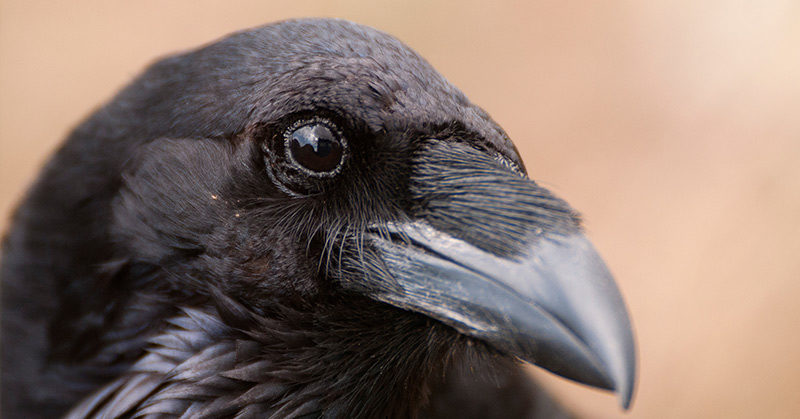You’ve likely heard the term “bird brain” before. Usually, it describes someone who lacks intelligence or who makes dumb decisions. Well, that saying may change because a new study has shown that crows have conscious thought.
For many years, people considered birds to be unintelligent compared to mammals and humans. We thought conscious decision-making was a trait only humans and mammals possessed. Birds, on the other hand, acted only based on instinct.
This new research is changing the way we think about avian intelligence. We are realising that birds may be far more intelligent than we have given them credit for.
Bird Brains Vs. Mammalian Brains
Consciousness is essentially everything you experience. It’s the ability to be aware of yourself and the world around you. It’s what allows you to know what you know, and to think about that knowledge. Consciousness makes us better at problem-solving and decision-making [1].
Humans’ ability to speak gave rise to higher-order, or secondary, consciousness, which is the state of being aware of your own existence [2]. Because they don’t talk, it is difficult to determine if animals have consciousness.
New research has revealed that crows are able to be consciously aware of the world around them. This means that they can have subjective experiences.
This type of consciousness is called primary, or sensory consciousness. It is an essential process in humans, but until now had only been demonstrated in primates. It is associated with the primate cerebral cortex. This is a complex, layered region of the mammalian brain.
The cerebral cortex participates in several functions in the body including:
- Determining intelligence
- Determining personality
- Motor function
- Planning and organization
- Touch sensation
- Processing sensory information
- Language processing [3]
Bird brains, on the other hand, are quite different in structure. Where mammalian brains have layers, bird brains are smooth. Despite this, corvids, which is the bird family that includes crows and ravens, are incredibly smart.
Previous research showed that like humans and apes, crows are actually capable of planning for the future [4]. This still did not prove, however, that they are capable of conscious thought.
Study: Crows Have Conscious Thought
Andreas Nieder is an animal physiologist at the University of Tübingen. He and his colleagues designed a test to determine whether or not birds could have subjective experiences using two crows.
They trained the birds to respond to visual stimuli by showing them screens on which lights were displayed. If the crows saw the lights, they were taught to nod their heads. Most of the lights were easy to see, and the crows were reliable at reporting that they had seen them.
Some of the lights, however, were brief and faint. This made them much more difficult to see. Sometimes the crows reported that they had seen them, and sometimes they didn’t.
The researchers showed each crow approximately twenty thousand signals over the course of several sessions. Researchers had implanted electrodes in the crows’ brains during the experiment to record their neuronal activity.
Neuronal activity was recorded in the interval between when the crow saw the light, and when they gave their answer. Every time they said yes, the researchers saw an increase in neuronal activity. Every time they said no, the researchers saw no change. This happened so reliably, that the scientists were able to predict the crows’ answers before they gave them [5].
Subjective Experiences
The experiment, says Nieder, proves that the nerve cells at the higher processing level of the crow’s brain produce subjective experiences. This means that primate brains are not the only ones who can have subjective experiences. It also means that the complex layering of the mammalian brain is not a requirement of consciousness.
“In any case, the capability of conscious experience can be realized in differently structured brains and independently of the cerebral cortex,” Nieder said in a press release [6].
A second new study confirmed this. Biopsychologist Martin Stacho of Ruhr-University Bochum in Germany used 3D polarized light training and neural circuit tracing techniques to characterise the anatomy of pigeon and owl brains.
They found that the structure of the cerebral cortex in birds is actually much more similar to mammals than we previously thought. This means that it is possible that our brains and bird brains are more closely related than they are different [8].
Scientists Have More Questions
Through this research, scientists are beginning to realize that primary consciousness may be far more common between birds and mammals that we originally thought. This, of course, has led them to ask even more questions.
The question on everyone’s mind now is whether or not birds are capable of secondary consciousness. Do they know they exist? Perhaps future studies will solve that problem.
- https://www.sciencealert.com/new-research-finds-crows-can-ponder-their-own-knowledge
- https://www.frontiersin.org/articles/10.3389/fpsyg.2011.00004/full
- https://www.ncbi.nlm.nih.gov/books/NBK538496/
- https://science.sciencemag.org/content/357/6347/202
- https://science.sciencemag.org/content/369/6511/1626
- https://uni-tuebingen.de/en/university/news-and-publications/press-releases/press-releases/article/tuebingen-researchers-show-conscious-processes-in-birds-brains-for-the-first-time/
- https://science.sciencemag.org/content/369/6511/eabc5534

